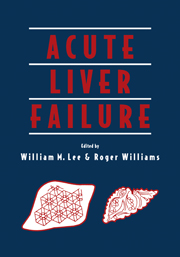Book contents
- Frontmatter
- Contents
- Preface
- Foreword
- Acknowledgments
- Contributors
- Part One Clinical Syndrome and Etiology
- Part Two Mechanisms of Disease and Multisystem Involvement
- Part Three Intensive Care Management
- Part Four Transplantation
- Part Five Artificial and Bioartificial Liver Devices
- Part Six Other Applications
- Index
- Plate section
Preface
Published online by Cambridge University Press: 20 May 2010
- Frontmatter
- Contents
- Preface
- Foreword
- Acknowledgments
- Contributors
- Part One Clinical Syndrome and Etiology
- Part Two Mechanisms of Disease and Multisystem Involvement
- Part Three Intensive Care Management
- Part Four Transplantation
- Part Five Artificial and Bioartificial Liver Devices
- Part Six Other Applications
- Index
- Plate section
Summary
This book is the outgrowth of two previous efforts to review current knowledge in acute liver failure. The first was the 1990 symposium/workshop entitled Acute Liver Failure, which was published by the British Society of Gastroenterology as a short monograph, and the second was a review with the same title in the New England Journal of Medicine in 1993. We became aware that there was no definitive text covering this topic. Although a relatively rare condition, none is so dramatic or devastating as acute liver failure, and this may explain the interest of so many clinical and research groups in a relatively uncommon problem. There are few other conditions in medicine in which young healthy patients can evolve to coma, intensive care and organ transplantation (or death) more rapidly, or for which the careful, considered, but rapid judgement of attending physicians is more important. We have used the term “acute liver failure” predominantly in this book where others frequently use the terms “fulminant hepatic failure” or “fulminant hepatitis.” When talking about the topic as a whole, we use acute liver failure as an umbrella term, while reserving fulminant hepatic failure for one form of acute liver failure having specific time limitations (see Chapter 1).
One of the main tenets of this book is that when liver failure occurs rapidly, it affects every organ of the body. As a result, many medical subspecialists become involved, from liver and gastrointestinal physicians, to nephrologists, intensivists, surgeons, neurosurgeons, as well as cell biologists, and those interested in biomechanical liver support.
- Type
- Chapter
- Information
- Acute Liver Failure , pp. xi - xiiPublisher: Cambridge University PressPrint publication year: 1996

